HONORING OUR AMERICAN LEGACY
HONORING OUR AMERICAN LEGACY
By Gerrye Wong May 22, 2019
The 2019 Golden Spike Conference’s theme was Honoring Our American Legacy, which I thought was very fitting because it celebrated the 150th Anniversary of the completion of the Transcontinental Railroad, of which many of the conferee’s forefathers had worked on. Over 500 supporters of Chinese American history, and especially those interested in celebrating this anniversary, attended the conference in Salt Lake City in May.
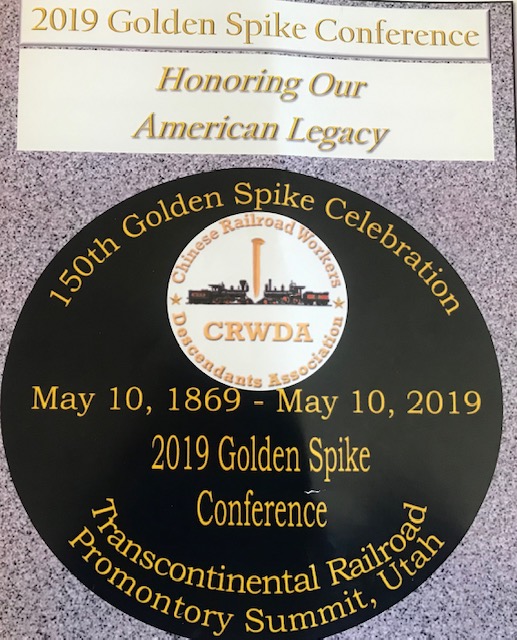
On May 10, 1869, when Leland Stanford and other leaders proclaimed the phenomenal achievement of completing the west side wing of the railroad, not one mention was made of the thousands of Chinese laborers who made that achievement happen. Not one Chinese was in the photograph taken at the ceremony to represent the labor force who toiled through inhumane elements to complete the job.
In 1969 at the 100th Anniversary, those in charge dropped Phil Choy off the program when he was representing the Chinese Historical Society and the keynote speaker only proclaimed the railroad completion was due to the hard toils of “Americans” with no mention of who were the toilers who completed the western end, the Chinese.
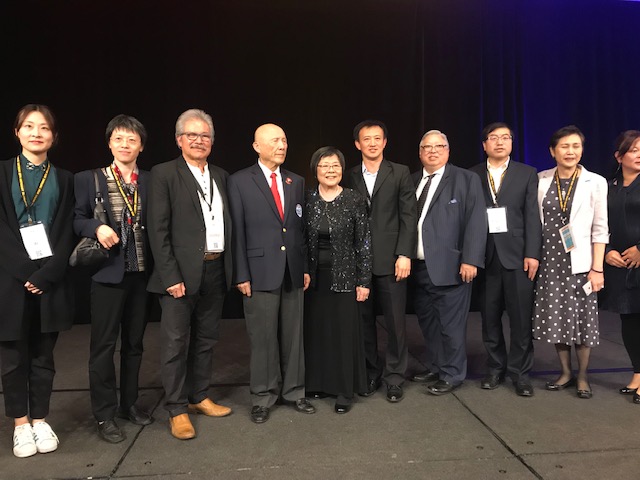
This year, due to the efforts of the CHINESE RAILROAD WORKERS DESCENDANTS ASSOCIATION, who staged the 2019 Golden Spike Conference during the time of the 150th Anniversary Ceremonies, over 500 Chinese were at the May 10th celebration to definitely make a presence. This year, I must credit the organizers because every speaker, whether it be Utah’s governor, senators or community leaders mentioned the long overlooked Chinese railroad workers and lauded their tenacity and determined hard labor that were the driving force to complete the railroad.
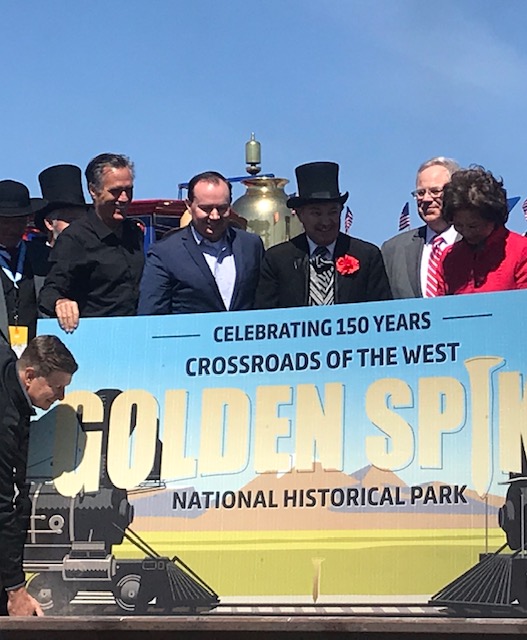
Department of Transportation Secretary Elaine Chao spoke of those original insults, as did Connie Young Yu, who is a railroad workers descendant as well as the daughter of John and Mary Young, who had gone to the ceremony with Phil Choy 50 years go for the 100th anniversary, and were shunned and not recognized on stage or in the programs as representatives of the railroad workers.
![]()
Both women spoke eloquently about this part of American history that had overlooked the contributions of the Chinese pioneers of that day, and were wonderful representatives on stage of all Chinese Americans. A wonderful photo was staged by famed photographer Corky Lee, of all of the Chinese attendees of the conference at the Promontory site in front of the trains, and I hope to share that photo with you readers someday of this momentous occasion.
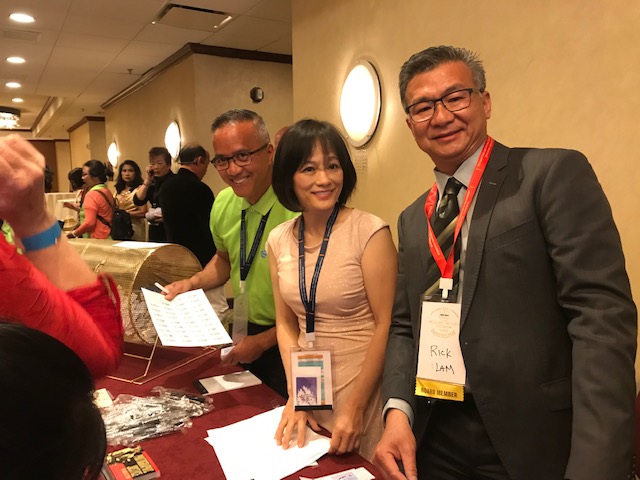
Organizers CRWDA Chairwoman Margaret Yee and CRWDA President Michael Kwan with a team of Salt Lake City volunteers, did an admirable job of helping us Chinese to make a statement and presence, as well as planning a worthwhile 3 days of activities for the conference attendees who had come from all corners of the US to participate in this historic event.
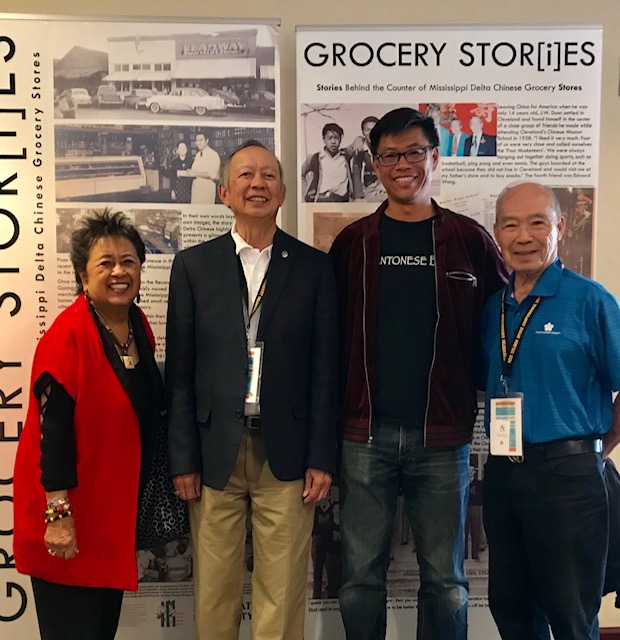
Thank you to the CHWDA Directors Jay Xu, Yu Li Lin, Siu Lin Santee, Ze Xiao, Patrick Tan, Angee Doan, Terrence Chen. Eunice Lane, Dean Hirabayashi, Rick Lam,Faye Mitsunaga, Edith Mitko and Patrick Santee who kept all of us conferees busy every day with activities so relevant to the railroad workers history.
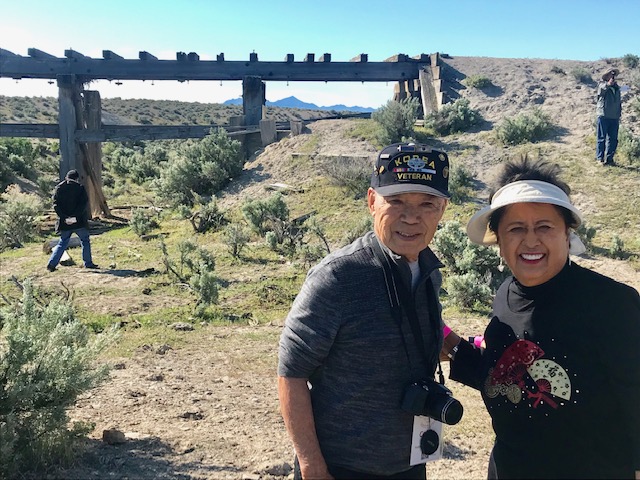
As soon as we arrived in town, we were welcomed warmly and efficiently by the CRWDA staff with thermos and back pack gifts. In multiple vans, we were taken on a journey to see the land grades where the Chinese workers laid the Transpacific railroad. We saw wooden culverts and trestles that were laid with back-breaking labor over and under mountains, the site of a settlement where many Chinese and Irish laborers dwelled in the middle of nowhere, and some of the actual findings of artifacts excavated and discovered in the area where they worked from 1864-69.
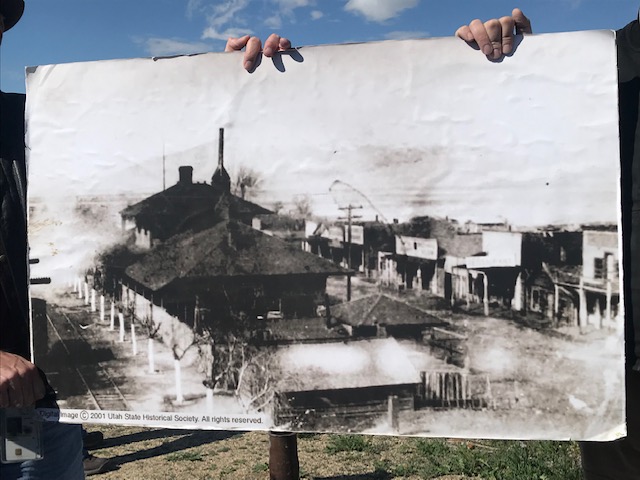
The Welcome Dinner Reception was highlighted by Keynote Speaker Major General William Chen, who told of his own life story growing up in America and serving in the US Army services during the Korean and Vietnam Wars. In the evenings, a superb musical titled GOLD MOUNTAIN by Jason Ma was presented during the three days of the conference, which depicted the chaotic lives of eight Chinese railroad workers , with a love angle thrown in. With music and dance, it brought to light the personal lives of the poor railroad laborers and made everyone even more keenly aware of the lonely existences they experienced in their search for Gold Mountains promises.
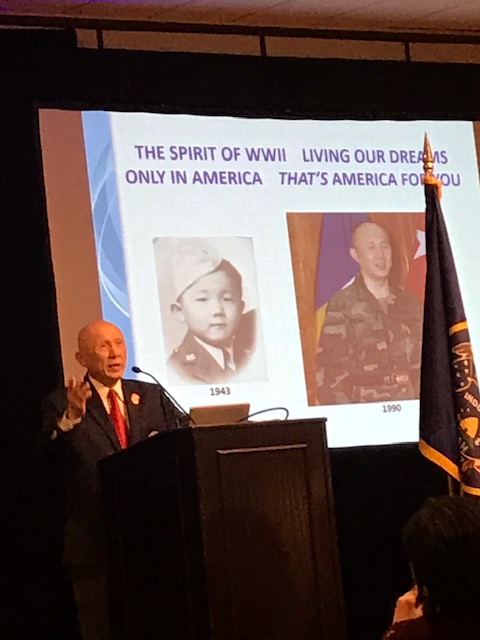
The second day was another excursion, this time via local Salt Lake City Municipal transportation to the Salt Lake Central Station where we boarded the modern FRONTRUNNER northbound to Ogden, where Union Pacific Railroad’s Celebration was being staged with two steam engine trains, known as Big Boy and #414, on display there to represent the historic trains of 1869.
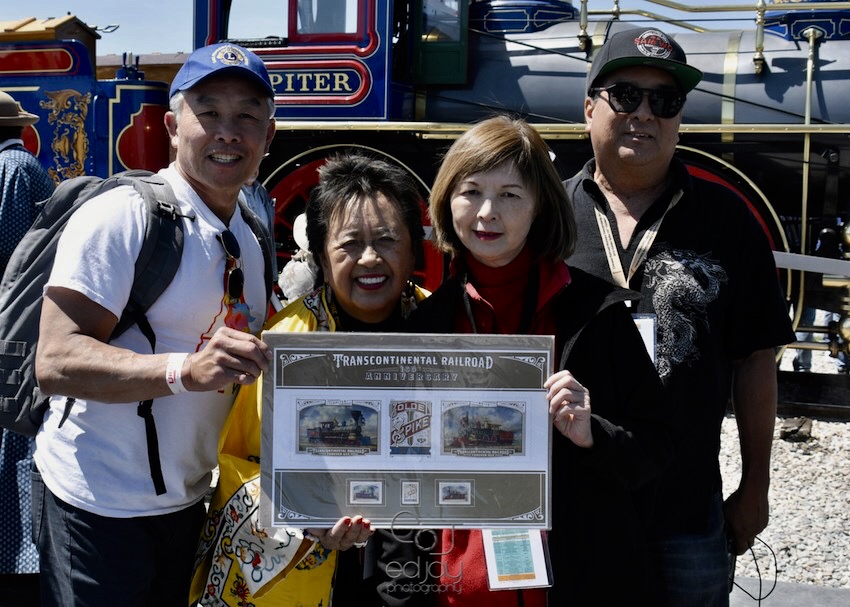
But it was May 10th that was the Big Day we were all waiting for to make our presence and to honor our forefathers. Large busses carried us during the 1 ½ hour ride to join over 20,000 Utah natives and train associations for the Golden Spike National Historic site celebration.
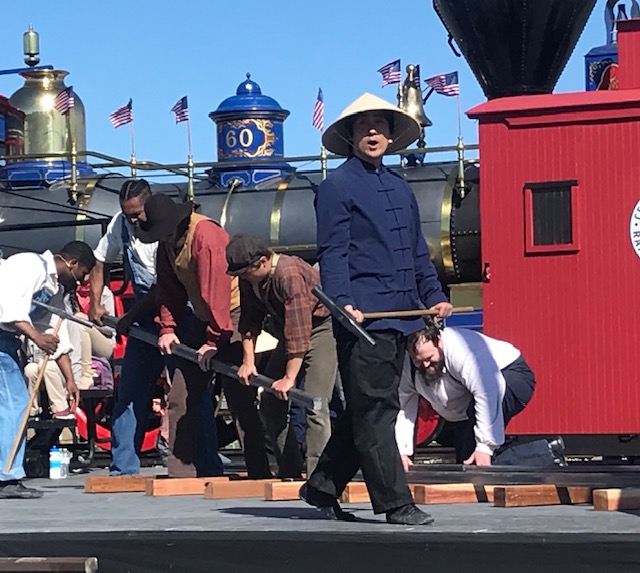
A musical show on stage started the program telling the story leading up to the joining of the transcontinental railroads, followed by noted political speakers from all over Utah, and yes, everyone spoke of the contributions of the Chinese laborers this time.
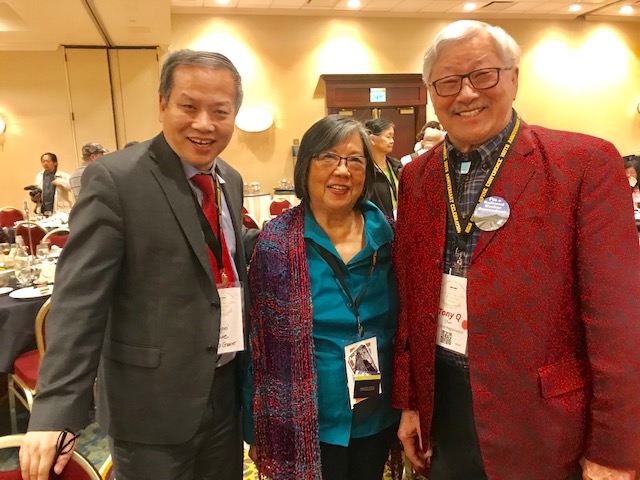
Although we represented only a minority among the ranks of viewers, our Chinese American presence was there, and I found many people coming up to express their appreciation of the Chinese workers who they now realized were the pioneers who were the heroes to complete the job during that time. There, young and old, of every nationality and descent, joined together to mark this 150th anniversary with pride and appreciation of history. I was so glad to be there.
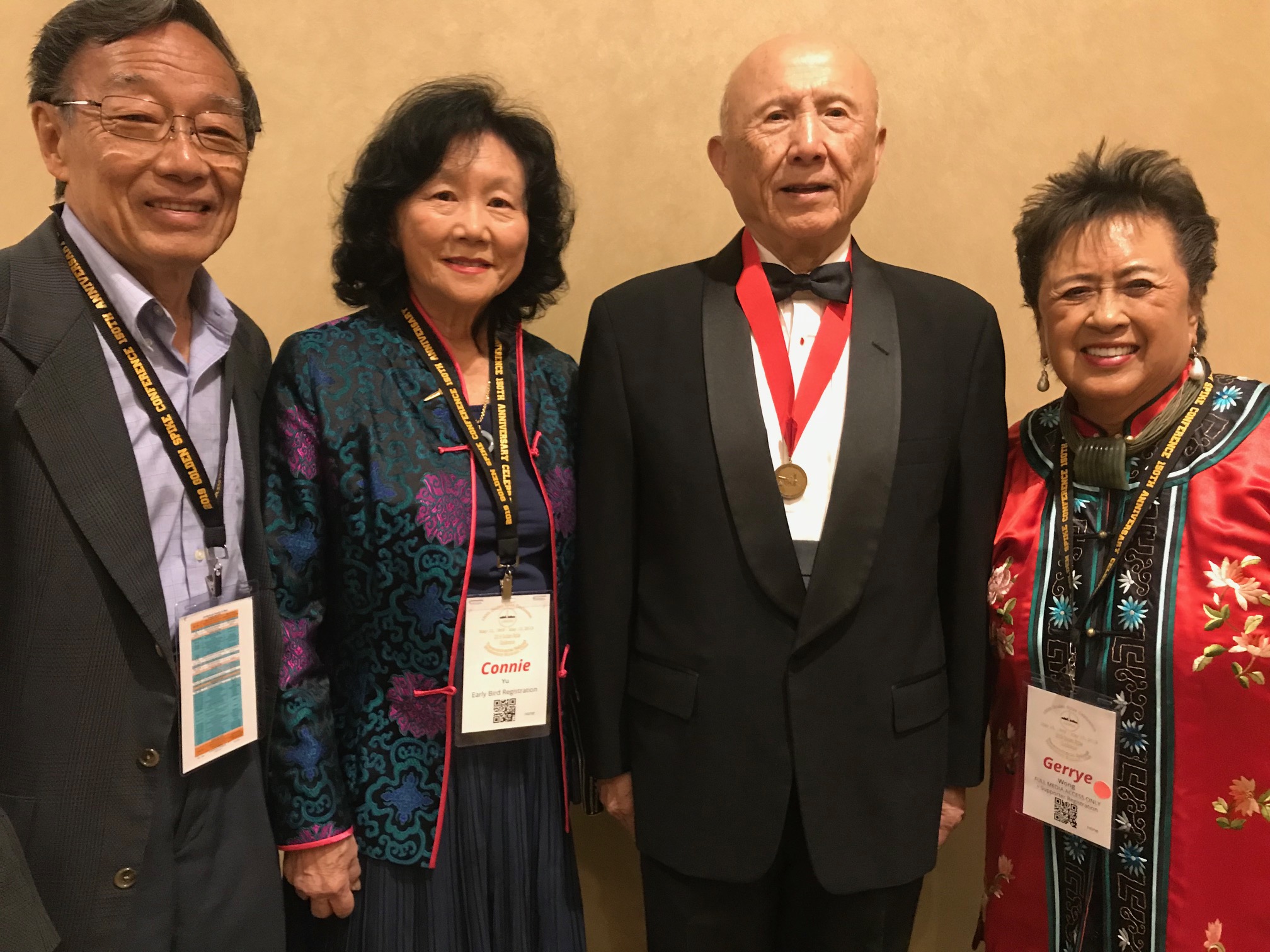
Fellow lovers and supporters of spreading Chinese American history there were my Chinese Historical and Cultural Project of Silicon Valley members Lee Liu and George Chin, Al Low, Brenda and Willie Wong, Debbie Gong-Guy, Judy Wong, Liz Chew, Dave Yick, Wanda Ching and Alex Locke.
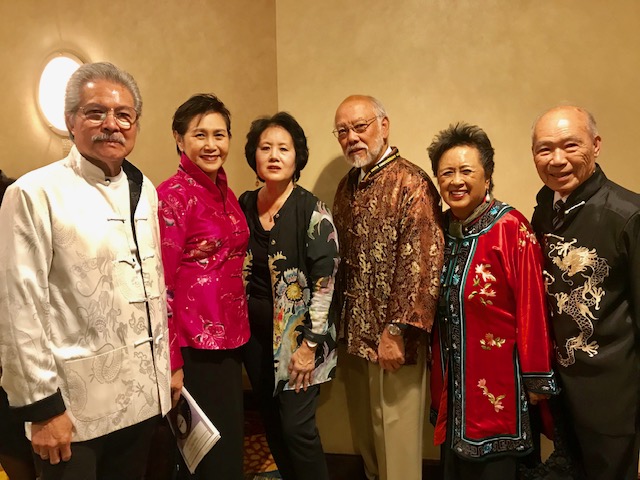
Other friends enjoying the Golden Spike conference seen were Galen and Anita Chow, Gerry and Randy Sabado, Tony and Carolyn Chan, Bruce Chin, Grant Din, Jonathan Leong, Steven Lee, Han Li, Leland Wong, David Pang, Tamiko Wong, Claudine Cheng, Tommy Wu, Sue Lee, Rowena Chow, Alvin Louie, and many new friends from New York, Washington DC, Los Angeles and Seattle.
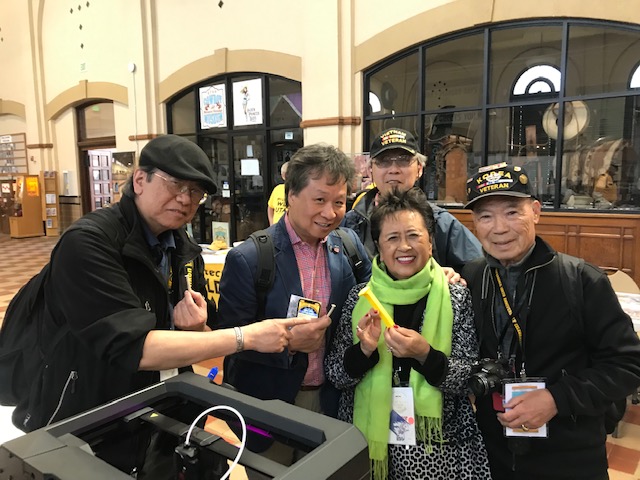
The final day of the conference was a series of speakers and panels presented by historians and lecturers from every corner of the US speaking of findings of the history of the railroad workers. Books and its contents were shared by authors, and no matter which source and site you took, you learned even more history of the Chinese laborers during the building of railroad.
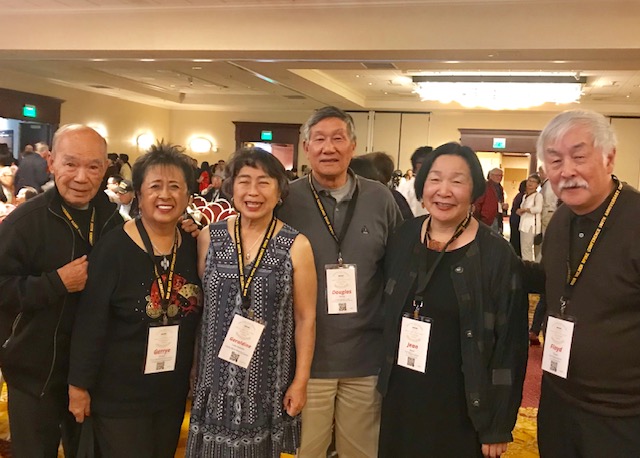
Thanks to those who told of their research projects on the Chinese Americans of the 1860s era, and shared stories of their forefathers by some of the descendants. Among the guest speakers were Gordon Chang, Chuimei Ho, Dr. Ray Chong, Baldwin Chui, Gilroy Chow, Jack Leong, Joseph Ng, Sue Fong Chung, Russell Low, Frank Wu, Laurene Wu McClain and many other outstanding researchers and speakers.
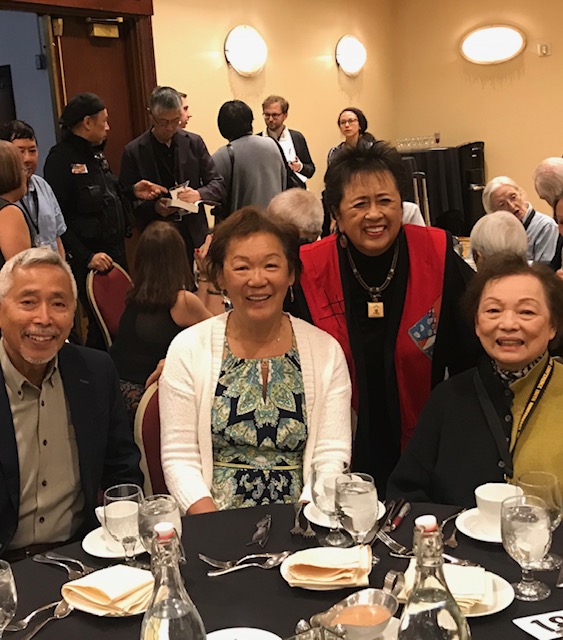
I met people from all over who joined together in the pursuit of learning more about the history of the Chinese railroad workers. Many were descendants in the academic world, but also there were many of us from local Chinese American historical societies interested in the railroad workers and their personal stories. It was another proud moment on stage when awards were given to special honorees, who were Gordon Chang – Chairperson’s Award, Corky Lee – Presidents Award, and Wilson & Esther Lee – Director’s Award.

We came away mesmerized by the history of the transcontinental railroad, but more importantly, we all felt a pride in our own Chinese heritage and forefathers and their dedication against all odds to complete a job, despite being treated discriminately and denied fair wages. We could now fully appreciate the fact they toiled continually through harsh environment and weather with the simple goal to earn enough money to send home or return home to their families. Too many were denied that dream and died in the attempt working on the railroads.
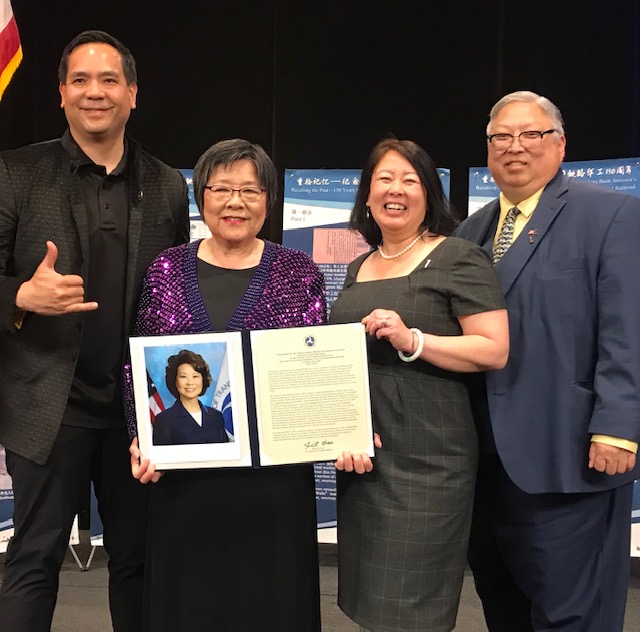
A big hurrah of appreciation must go to the CRWDA leaders who had the vision and foresight to make this conference statement to the world that the Chinese were an integral part of this section of American history, never to be overlooked again. Take a bow, Michael Kwan, Margaret Yee and Karen Kwan for helping to make it happen! Collaborative historical societies and historians who joined in with your knowledge, and sponsors with your dollars, please accept everyone’s appreciation for a goal achieved!

Let’s have more of these conferences on Chinese American history – and I will be there to join the ranks of those of us Chinese Americans who wish to learn more about this long overlooked history of our Chinese pioneers who paved the way for us to now live and be welcomed in America today. Who wants to join in this future goal?
